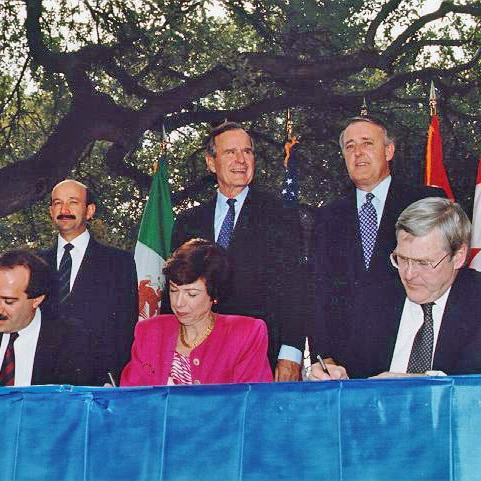
Canada is formally demanding, in talks on a new NAFTA agreement, that any such pact force the U.S. to eliminate so-called right-to-work laws.
During the 2016 U.S. campaign, GOP presidential nominee Donald Trump labeled NAFTA “the worst trade pact ever signed” and vowed to dump it. That promise helped him gain a 50-50 split among unionists and their families in key Great Lakes industrial states. By narrowly carrying Ohio, Pennsylvania, Michigan and Wisconsin, Trump wound up in the White House.
But once there, he decided to renegotiate, not dump, NAFTA, with what he says is the objective to help U.S. workers. The current NAFTA hasn’t. U.S. unions say Trump has adopted only a few pro-worker NAFTA negotiating goals, out of a 47-page detailed list presented during pre-talks hearings.
Instead of Trump, Canadian negotiators have begun pushing hard to eliminate U.S. based right to work laws which have served to deteriorate wage rates and living standards for workers in the United States. This has in turn harmed workers in Canada as well, along with those in the free to bargain states, where employers have used the existence of lower right to work labor standards to drive down wages and benefits for working families.
Related News
- Senate Hearing Highlights the Good, the Bad, and The Ugly of RRB
- On-Duty Assault Leaves Amtrak Conductor Facing Financial Hardship
- Transit Equity Day: Remembering Rosa Parks
- Railroads Have Short Memories: East Palestine 3 Years Later
- SMART Local 1 signs new contractor to complete specialized workforce request
- RIDER Safety ACT Aims to Curb Transit Assaults Nationwide
- Rail Safety Is Too Important For Corporate Discretion
- Virginia 2-PC Law Could Become a Reality if We Act Now
- WATCH: Members Step Up to Take Care of Their Own
- Fighting for prevailing wage in the shop: Massachusetts union leader explains the offsite fabrication loophole